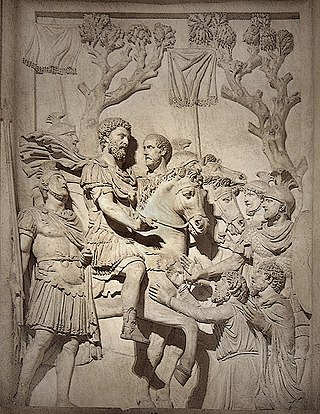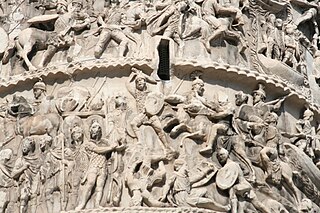Related Research Articles

Marcus Aurelius Antoninus was Roman emperor from 161 to 180 and a Stoic philosopher. He was a member of the Nerva–Antonine dynasty, the last of the rulers later known as the Five Good Emperors and the last emperor of the Pax Romana, an age of relative peace, calm, and stability for the Roman Empire lasting from 27 BC to 180 AD. He served as Roman consul in 140, 145, and 161.
Year 170 (CLXX) was a common year starting on Sunday of the Julian calendar. At the time, it was known as the Year of the Consulship of Clarus and Cornelius. The denomination 170 for this year has been used since the early medieval period, when the Anno Domini calendar era became the prevalent method in Europe for naming years.
Marcus Cornelius Fronto, best known as Fronto, was a Roman grammarian, rhetorician, and advocate. Of Berber origin, he was born at Cirta in Numidia. He was suffect consul for the nundinium of July–August 142 with Gaius Laberius Priscus as his colleague. Emperor Antoninus Pius appointed him tutor to his adopted sons, the future emperors Marcus Aurelius and Lucius Verus.

Classical Latin is the form of Literary Latin recognized as a literary standard by writers of the late Roman Republic and early Roman Empire. It formed parallel to Vulgar Latin around 75 BC out of Old Latin, and developed by the 3rd century AD into Late Latin. In some later periods, the former was regarded as good or proper Latin; the latter as debased, degenerate, or corrupted. The word Latin is now understood by default to mean "Classical Latin"; for example, modern Latin textbooks almost exclusively teach Classical Latin.

Lucius Aurelius Verus was Roman emperor from 161 until his death in 169, alongside his adoptive brother Marcus Aurelius. He was a member of the Nerva–Antonine dynasty. Verus' succession together with Marcus Aurelius marked the first time that the Roman Empire was ruled by more than one emperor simultaneously, an increasingly common occurrence in the later history of the Empire.

Lucius Aelius Caesar was the father of Emperor Lucius Verus. In 136, he was adopted by the reigning emperor Hadrian and named heir to the throne. He died before Hadrian and thus never became emperor. After Lucius' death, he was replaced by Antoninus Pius, who succeeded Hadrian the same year.

Tiberius Claudius Pompeianus was a politician and military commander during the 2nd century in the Roman Empire. A general under Emperor Marcus Aurelius, Pompeianus distinguished himself during Rome's wars against the Parthians and the Marcomanni. He was a member of the imperial family due to his marriage to Lucilla, a daughter of Marcus Aurelius, and was a key figure during the emperor's reign. Pompeianus was offered the imperial throne three times, though he refused to claim the title for himself.
Aelius Herodianus or Herodian was a Greek historian and one of the most celebrated grammarians of Greco-Roman antiquity. He is usually known as Herodian except when there is a danger of confusion with the historian also named Herodian.

The gens Aurelia was a plebeian family at ancient Rome, which flourished from the third century BC to the latest period of the Empire. The first of the Aurelian gens to obtain the consulship was Gaius Aurelius Cotta in 252 BC. From then to the end of the Republic, the Aurelii supplied many distinguished statesmen, before entering a period of relative obscurity under the early emperors. In the latter part of the first century, a family of the Aurelii rose to prominence, obtaining patrician status, and eventually the throne itself. A series of emperors belonged to this family, through birth or adoption, including Marcus Aurelius and the members of the Severan dynasty.

The Marcomannic Wars were a series of wars lasting from about AD 166 until 180. These wars pitted the Roman Empire against principally the Germanic Marcomanni and Quadi and the Sarmatian Iazyges; there were related conflicts with several other Germanic, Sarmatian, and Gothic peoples along both sides of the whole length of the Roman Empire's northeastern European border, the river Danube.
Phrynichus Arabius or Phrynichus of Bithynia was a grammarian of the Greek language who flourished in 2nd century Bithynia, writing works on proper Attic usage. His name is also transliterated as Phrynichos or Phrynikhos. His ethnic background is disputed, mainly between an Arab and Bithynian Greek descent.

The early life of Marcus Aurelius spans the time from his birth on 26 April 121 until his accession as Roman emperor on 8 March 161.
The Roman–Parthian War of 161–166 was fought between the Roman and Parthian Empires over Armenia and Upper Mesopotamia. It concluded in 166 after the Romans made successful campaigns into Lower Mesopotamia and Media and sacked Ctesiphon, the Parthian capital.

The reign of Marcus Aurelius began with his accession on 7 March 161 following the death of his adoptive father, Antoninus Pius, and ended with his own death on 17 March 180. Marcus first ruled jointly with his adoptive brother, Lucius Verus. They shared the throne until Lucius' death in 169. Marcus was succeeded by his son Commodus, who had been made co-emperor in 177.
Marcus Petronius Sura Mamertinus was a Roman consul who lived in the 2nd century and was one of the sons-in-law of the Emperor Marcus Aurelius.
Gnaeus Claudius Severus was a Roman senator and philosopher who lived in the Roman Empire during the 2nd century AD.

Gaius Julius Sohaemus was a Roman client king of Armenia.
Bakur, also known as Aurelius Pacorus or Pacorus was a Parthian Prince who served as one of the Kings of Armenia in the 2nd century.
Marcus Claudius Fronto was a Roman senator and Consul, and a general in the Imperial Roman army during the reigns of emperors Antoninus Pius, Marcus Aurelius, and Lucius Verus.
References
- ↑ Cf. Phrynichus p. 225 s.v. βασίλισσα, p. 379 s.v. τὰ πρόσωπα (ed. Christian Lobeck).
- ↑ Fronto Letters to his friends 1.4 (pp. 187, 237).
- ↑ S. Argyle 1989, "A new Greek grammarian", Classical Quarterly 39.2: 524-35.
![]() This article incorporates text from a publication now in the public domain : Smith, William, ed. (1870). Dictionary of Greek and Roman Biography and Mythology .
This article incorporates text from a publication now in the public domain : Smith, William, ed. (1870). Dictionary of Greek and Roman Biography and Mythology .{{cite encyclopedia}}: Missing or empty |title= (help)